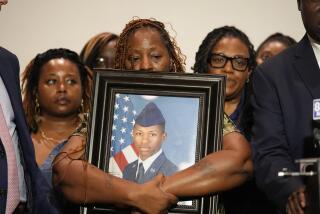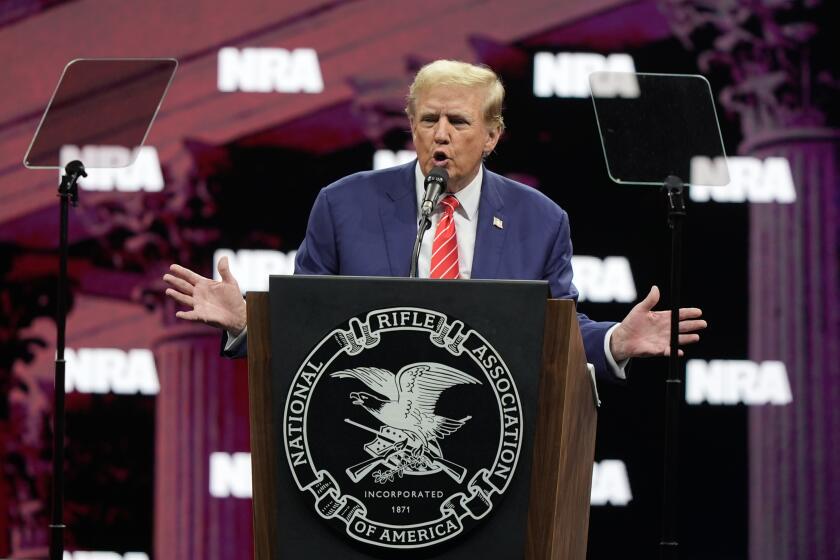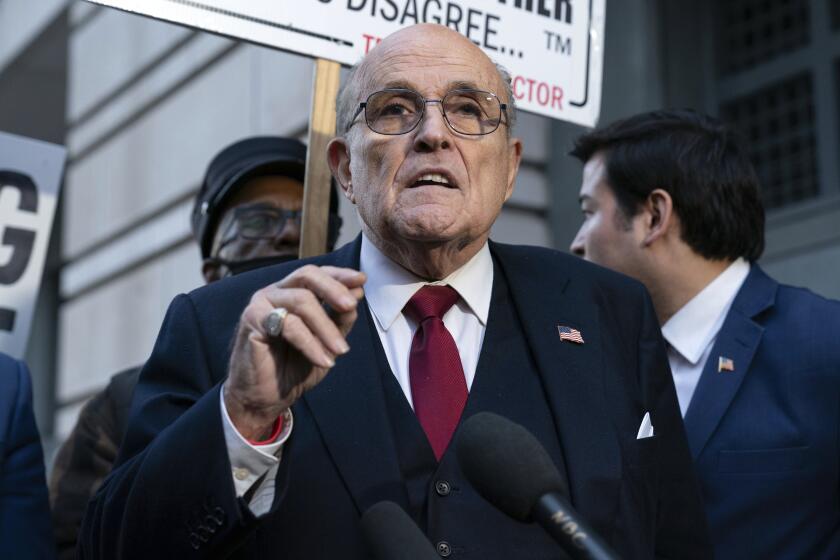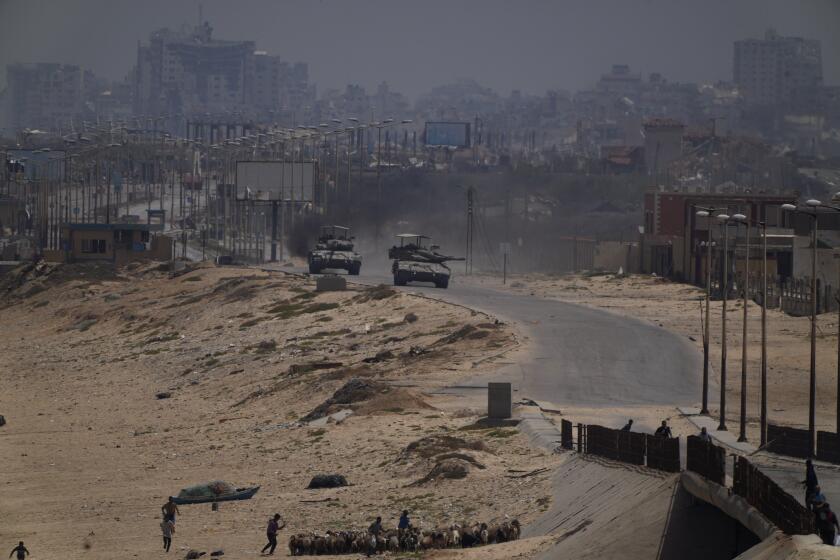Iraqis Sign Interim Charter
Less than a year after the ouster of Saddam Hussein, members of the Iraqi Governing Council, with American and British officials looking on, signed an interim constitution Monday designed to pave the way to democratic self-rule.
Amid the smiles, jauntily raised pens and handshakes, a shadow hung over the day as the country’s powerful Shiite Muslim cleric, Grand Ayatollah Ali Sistani, maintained his objections to the document. Sistani and his followers believe that the new charter gives too much influence to Kurds and other minorities at the expense of Iraq’s Shiite majority. Under the new law, Kurds wield enough votes to thwart passage of a permanent constitution.
In a statement issued on his website Monday, Sistani said the interim constitution “places obstacles in the path of reaching a permanent constitution for the country that maintains its unity, the rights of its sons of all sects and ethnic backgrounds.”
Even before the ink had dried, Sistani’s followers spoke about seeking changes in the coming weeks.
Leading Shiite politician Abdelaziz Hakim was joined by four other Shiite council members who refused to attend the signing ceremony. Hakim and the others sent deputies to sign on their behalf. It was an unsubtle message that the debate over how to allocate power among the long-oppressed Shiite majority and other groups is not settled, and it carried a reminder that religious or ethnic rifts may yet occur.
A source close to the negotiations, who insisted on being identified only as a senior coalition official, said during a conference call for reporters Monday night that the most notable point was that the Shiites had agreed to go forward with the law.
“All I can tell you is, the clear mood in the council over last week, and particularly today, is that they are going to go ahead and work with this law, and they will,” he said.
Despite the objections of Sistani and his supporters, the twice-delayed signing ceremony took on a celebratory -- even inspirational -- tone as Shiite, Sunni and Kurdish leaders spoke in turn and pledged to transform Iraq into a haven for individual rights and freedoms.
Recalling the carnage wreaked by suicide bombers who detonated their explosives among thick throngs of Shiite pilgrims only six days earlier, Kurdish leader Massoud Barzani said: “The creation of this law is the best response to those criminals.”
Adnan Pachachi, the octogenarian Sunni who served as Iraq’s foreign minister and U.N. ambassador before Hussein took power, praised the new law for its full complement of human and civil rights “that cannot be touched or abridged.”
Responding to critics who say that the law’s guarantee of human rights merely copied Western models, he said: “These rights are not the exclusive property of the West, but are universal values. They should be followed in every time and place.”
President Bush said in a statement that “while difficult work remains to establish democracy in Iraq, today’s signing is a critical step in that direction.”
“This document is an important step toward the establishment of a sovereign government on June 30,” Bush said. “It lays the foundation for democratic elections and for a new constitution.”
Bush, speaking separately in Texas, said the signing would establish American-style freedoms of religion, speech and assembly for Iraq.
In Baghdad, the 25 members of the Governing Council or their representatives filed into the lobby of the convention center after a patriotic performance by six children in traditional outfits. For the day, other pressing political and military matters -- such as the need to defeat a stubborn insurgency and create a broad-based transitional government in the next 3 1/2 months -- were set aside.
Laying out a detailed plan for establishing a permanent government, the law allows the United States and Britain to hand over political control to Iraqis by the June 30 deadline. Officials say the U.S. and its allies will have to keep troops in the country for at least several more years.
The interim constitution contains a promise that Iraqis would be guaranteed basic human rights -- including freedom of expression and assembly, the right to a fair trial by an independent judiciary, security from arbitrary arrest or search, a ban against the use of torture and freedom from discrimination on the basis of religion, ethnicity or gender.
Whether ordinary Iraqis believe in these promises remains to be seen.
On the streets of Baghdad, people interviewed at random said they were skeptical that the Governing Council had the power to fulfill its pledges. Some said they were more interested in greater security and prosperity than human rights.
“Give me something tangible. I don’t need to listen to more of this junk,” said Mohammed Abdul Razaq, 50, who said he was unemployed. “We are a very weary people. We have lived through 35 years of terror and misery, and this one year since the fall of Saddam feels like 10.”
Outside the Baghdad Convention Center, heavy security -- including sniffer dogs, grim-faced soldiers on the lookout for suicide bombers and helicopters swooping low to inspect vehicles for rockets -- underlined the threats facing the new Iraqi state. Only the night before, volleys of rockets fell on the Rashid Hotel opposite the convention center, an attack interpreted here as insurgents’ response to the interim constitution.
The law, first agreed on by the council a week ago, was scheduled to have been signed Wednesday. The signing was postponed after a wave of suicide bombings last Tuesday against pilgrims celebrating Ashura, the holiest Shiite holiday period, killed at least 181 people in Karbala and Baghdad. On Friday, five Shiite politicians abruptly refused to sign the interim constitution, citing objections from Sistani, a 73-year-old Iranian-born cleric who heads the Hawza, the network of senior clerics and their students centered in the holy city of Najaf.
Sistani has kept an arm’s-length relationship with the U.S.-led occupation authority, refusing to meet with U.S. administrator L. Paul Bremer III. But he has been an active force in the negotiations, even from a distance, arguing successfully that the next permanent constitution for Iraq must be written by a body directly elected by the people.
Hakim, the representative of the Supreme Council for Islamic Revolution in Iraq, refused to sign the law to signal his continued discontent, a spokesman said.
“If you have reservations, then I don’t think it’s appropriate for him to be there,” said Hamid Bayati, the spokesman for the Supreme Council.
“We signed the agreement in order not to jeopardize the process, but we will try to alter several of the things in it,” he said, indicating that the organization wanted to strike a balance between registering its opposition and maintaining some stability in the country.
The Shiites’ main concern involves the Kurds’ virtual veto power over the constitution. Under the fundamental law signed Monday, a permanent constitution -- scheduled to be written next year and then submitted to the Iraqi people in a referendum -- could be scuttled if two-thirds of voters in three provinces cast ballots against it. Rewriting the constitution and submitting it to voters for approval could indefinitely prolong the period of the provisional government, Bayati said.
“We could end up running in a circle,” he said.
Baghdad University political scientist Jaber Habib said Hakim “did not want to associate himself with the new law” so that he would have more political flexibility in later negotiations.
It is in the interest of the Americans -- as well as the Kurds and Sunnis -- to keep the provisions demanded by the Kurds in place, because they guarantee them influence in future negotiations.
Because the Kurds, who are overwhelmingly secular, might attempt to secede if the Shiites demanded an Islamic state, the Americans find the provision helpful to keep Shiites in check.
“This keeps the U.S. involved as a referee,” Habib said. “The Shiites know they need the approval of the U.S. to do things, otherwise the Kurds will leave, and the Kurds leaving is a very serious threat.”
*
(BEGIN TEXT OF INFOBOX)
Principles of Governance
The basic principles of Iraq’s interim constitution include:
* The system of government will be republican, federal, democratic and pluralistic. Federalism will be based on geography, history and the separation of powers rather than ethnicity or sect.
* The armed forces will be controlled by Iraq’s civilian leadership.
* Islam will be the official religion of the state and considered a source of legislation. The law will respect the Islamic identity of the majority of Iraqis and guarantee the freedom of religious belief and practice.
* Arabic and Kurdish will be the official languages.
* The transitional government will contain checks and balances and adhere to the doctrine of separation of powers.
* Transitional executive authority will consist of the presidency and a council of ministers, including the prime minister.
* The transitional legislative authority will be vested in a national assembly, which will pass laws and help select and oversee the executive authority. The assembly will be freely elected by the people of Iraq, under an electoral system designed to give 25% of seats to women.
* The people of Iraq are sovereign and free. All Iraqis are equal in their rights without regard to gender, nationality, religion or ethnic origin, and they are equal before the law. The government will respect the rights of the people, including the rights:
-- To freedom of thought, conscience and expression
-- To assemble peaceably and to associate and organize freely
-- To justice; to a fair, speedy and open trial; and to the presumption of innocence
-- To vote, according to the law, in free, fair, competitive and periodic elections
-- To file grievances against officials when these rights have been violated.
Source: Associated Press
*
Times staff writer Alissa J. Rubin contributed to this report.
More to Read
Start your day right
Sign up for Essential California for news, features and recommendations from the L.A. Times and beyond in your inbox six days a week.
You may occasionally receive promotional content from the Los Angeles Times.






